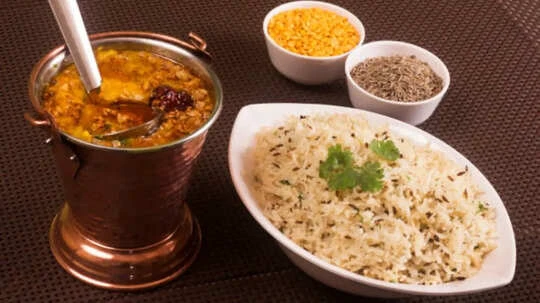Dal chawal, or a plate of lentils and rice, is not just a comfort food but is packed with healthy nutrients as well. A staple in the Indian kitchen, this combination is considered a complete meal that checks all the boxes when it comes to keeping your heart health regulated.
According to experts, dal chawal is among the most sustainable diets for your cardiovascular health in the long run.
While considered a taste bomb, this simple meal is also delicious, as it does not involve imported superfoods, boring salads, or bland oats.
How does dal chawal benefit?
A bowl of dal rice is great for stabilising our heart and blood sugar levels. Apart from being easy to digest, it also improves your sleep quality. Experts believe rice increases the sensitivity of leptin, produced by fatty tissue that regulates fat storage in your body. And since rice is also a prebiotic, it promotes the growth of beneficial bacteria in your gut.
Similarly, lentils – especially yellow moong – are a powerhouse of protein and easy to digest. It is also a great source of iron and folate, essential for healthy blood production.
How does dal and rice elevate your heart health?
Both dal and rice, especially when combined as a balanced meal, can be beneficial for your heart health. Experts say the combination provides a good source of protein, fibre, and all the essential macro- and micronutrients, which helps manage cholesterol levels, reduce the risk of heart disease, and promote overall cardiovascular health.
The meal is also packed with potassium and magnesium, important minerals for maintaining healthy blood pressure and heart function. The low-fat and high fibre content in dal chawal is great for reducing cholesterol levels and therefore best for your heart in the long run.
Also, when combined, dal and rice create a complete protein profile – especially if you are totally relying on plant-based diets – providing all the essential amino acids required by your body, which are often missing in individual plant-based foods.
The combination of fibre from dal and the carbohydrate from rice also results in a lower glycemic index meal, which maintains a steady blood sugar level, especially for those who are battling diabetes.
Why should Indians focus more on heart-healthy diets?
According to experts, the rate of heart diseases in India is increasing, as statistics say more people are developing heart issues 10-15 years earlier than those in Western countries. One in four heart attack patients in India is under 40.
And so, it is important to incorporate a high-fibre, protein, omega-3, and vitamin diet which lowers heart issues among people of all age groups.
